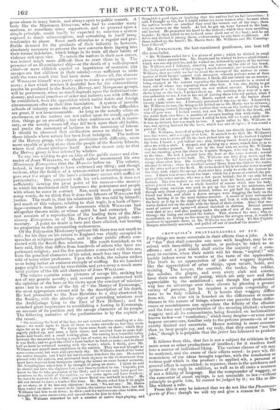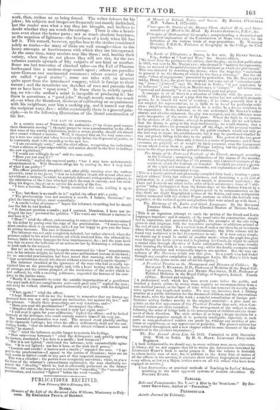CROWQUILL'S PHANTASMAGORIA OF FUN. FEW things are more uncertain in
their effects than a joke. A bit of " fun " that shall convulse one man with laughter, may be re- ceived with immobility by another, or perhaps be taken as an affront ; and a jest which shall excite the majority of a com- pany to exclaim, when their mirth will let them, "capital!" will merely induce some to wonder at the taste of the applauders. The truth is, an appreciation of joke and waggery depends, like the appreciation of other things, upon nature, habit, and
training. The lawyer, the courtier, the trader, the soldier, the scholar, the player, and even every club and coterie, have their own modes of jesting, which are only now and then appreciable by the uninitiated ; and though the professional wag has an advantage over these classes by pleasing a greater variety of persons, yet he requires a certain congeniality of
taste to be fully relished. It is herein that waggery differs from wit. As true wit is founded on the differences or resem- blances in the nature of things, whoever can perceive those differ- ences or resemblances can appreciate the felicity of the allusion and the force and comprehension of the meaning elicited; whereas waggery and all its concomitants, being founded on technicalities known to few—or " tomfoolery," which many despise—or even some bygone occurrences, familiar only to the persons present—is of ne- cessity limited and uncertain. Hence nothing is more common than to hear people say, and say truly, that they cannot "see the joke," though it is palpable that the jester has laboured to produce one.
It follows from this, that fun is not a subject for criticism in the same sense as other productions of intellect ; for it resolves itself into a matter of individual liking. The various classes of wit may be analyzed, and the cause of their effects noted: in pure wit, the remoteness of the ideas brought together, with the conclusion or tertium quid which is the product ; in applied wit, a personal or general effect is superadded; in repartee, there is the quickness and aptness of the reply in addition, as well as in all cases a neatness if not a felicity of language. But the compounder of waggery, or the concoctor of smart sayings, is not amenable to law—without principle to guide him, he cannot be judged by it ; we like or dis- like without a rule.
From this it may be inferred that we do not like the Phantasma- goria of Fun; though we will try and give a reason for it. The work, then, strikes us as being forced. The writer labours for his jokes ; his subjects and images are frequently not merely farfetched, but the reader sees what a way they are brought, and inclines to doubt whether they are worth the carriage. There is also a heavi- ness even about the better parts ; not so much absolute heaviness, as the negation of lightness—the heaviness of a body when life has left it. This remark, however, applies less to the stories considered solely as stories—for many of them are well enough—than to the heavy attempts at facetiousness with which they are interspersed. At the same time, many readers may like them ; and, besides their variety, when they do not please they will not tire, for the two volumes contain upwards of fifty subjects of one kind or another. Some are bad travesties of classical tales—as the Fall of Phaeton burlesqued into a modern stage-coach upset ; others are parodies upon German and sentimental romances ; others consist of what are called " good stories "; some are tales with an interest quite apart from the introduced waggery, which is foreign to their nature ; and the remainder are sketches of men and pursuits that are or have been " upon town." In these there is, strictly speak- ing, no wit—the author's mind is incapable of producing it : but there is sometimes a " good joke," though mostly made too much of,—as when the blunderer, desirous of cultivating an acquaintance with his neighbour, sent him a sucking pig, and it turned out that the recipient was:a Jew : whilst occasionally there is a general prin- ciple,—as in the following illustration of the literal construction of the law.
TOE LAW OF LANTERNS.
In a certain town of Normandy, the authorities (" for divers good reasons them thereunto moving ") thought proper to issue a proclamation to the effect that none of the worthy inhabitants, under a severe penalty, should stir abroad after sunset without a lantern. Well, it chanced that on the very same even- ing a man was seized and taken incontinently before the dispenser of justice, to be summarily dealt with according to the new law.
" I am exceedingly sorry," said the chief officer, recognizing the individual, " that a citizen of your respectability and station should be the first to infringe the new regulations."
"I would not willingly do so," said the man coolly.
"Have you not read it ? "
"Certainly," replied the captured party; "but I may have unfortunately misunderstood it. Will Monsieur oblige me by reading it, that I may learn of what I am guilty? "
The officer graciously complied ; and, after glibly running over the verbose preamble, came to the point, " that no inhabitant should stir abroad after sun- set without a lantern,"—which he certainly delivered with peculiar emphasis, to the admiration of the fellow who had taken the man in custody, and was twid- dling his fingers, impatient to receive his moiety of the fine.
" I have a lantern, Monsieur," firmly contended the man, holding it up to view.
" Yes; but there is no candle in it," replied the officer with a smile. " The proclamation does not mention a candle, I believe, Monsieur," re- plied the cunning fellow, most respectfully.
" A candle!—but of course—" began the informer, trembling lest he should lose the fish he had hooked.
" It does not mention a candle ; and I contend, Monsieur, I have not in- fringed the law," persisted the quibbler. " The words are without a lantern'— and here it is."
" Hem!" cried the officer, endeavouring to conceal the confusion occasioned by his defeat by poring over the copy of the proclamation. "I must—yes, I must confess there is an omission, and—I am too happy to give you the bene- fit arising tbereout. The case is dismissed." The informer was not only completely defeated, but rather alarmed, when the prisoner called to his mind a certain act which rendered him, the aforesaid in- former, liable to heavy damages for false imprisonment, &c.; and the poor devil was fain to avert the infliction of an action-at-law by disbursing a certain sum in hard cash to the accused.
But to ! on the next evening he again encountered his " dear " acquaintance, and, to his infinite delight, he beheld the same unillumined lantern in his hand ; for an amended proclamation had been issued that morning, with the words "that no inhabitant should stir abroad without a lantern and a candle therein !"
The informer chuckled at the ignorance of the man who had so coolly vic- timized him on the preceding night, and, with a heart beating with the desire of revenge, and the certain prospect of the restitution of the mulct which he had suffered, he, with a sneering politeness, requested the honour of his come parry to the justice-room. " Really it is impossible to resist the amiable importunities of a gentleman who pays such delicate compliments and—such good coin !" replied the man ; and away he walked, chatting good-humouredly and joking with his delighted
captor.
" What, again? " cried the officer. " I hope Monsieur will do me the honour to remember that my former ap- pearance here was not only against my inclination, but against the law," said the prisoner. " Really these proceedings are very vexatious, and—" " Have you read the proclamation?' interrupted the officer. "Monsieur did me the favour to read it only last night, and—" " I will read it again for your edification," replied the officer ; and he looked furtively at the informer, who could scarcely contain himself for very joy. The amended proclamation was read. The accused stood placidly smiling at the rigmarole verbiage; but when the officer deliberately dealt out the con• eluding words, "that no inhabitant should stir abroad without a lantern and candle," be started.
" Ha!" cried the informer, unable longer to restrain his feelings. " How very—very fortunate! " cried the delinquent ; and, quickly opening his lantern, continued, " Lo, here is a candle : how fortunate!" "But it is not lighted," exclaimed the informer, with uncontrollable agita- tion. "It is not lighted ; nor has it been. as the wick itself proves."
"Lantern and candle! a lantern and a candle ;" repeated the man. " I ap- peal to the proclamation—I appeal to the justice of Monsieur; there are no such words as lighted candle in any part of that respected document."
This was a clencher : the parties were completely outwitted ; while, to abate the fever of the informer's extraordinary excitement, the man charitably re- peated the "bleeding" which he had so effectually performed on the former occasion. Of course, the lawyers lost no time in " amending " the " amended " proclamation, and inserted "lighted " before the word "candle."



























 Previous page
Previous page